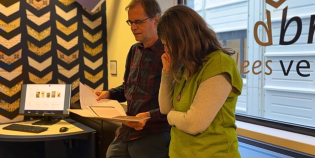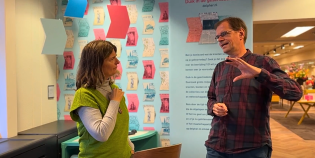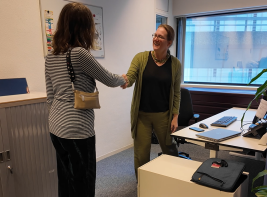In this column, new Director General Wilma van Wezenbeek is getting to know the KB. Behind the scenes, she meets colleagues who do important work that not everyone is aware of. This often involves work on an impressive scale. Today: functional administration.
Text continues below the video.
Digital services of the KB
Pride. No other word could describe it better. We reach 1 in 3 Dutch people with the online Library and our digital services DBNL.org and Delpher.nl. That's fantastic.
A lot of people work hard to keep these KB services running efficiently, for both users and employees. Malfunctions in the systems our colleagues work with could have a major impact on the availability of our websites. Functional administrators are the colleagues who deal with any issues in these systems.
This week, I spoke to Frank Heinen. He is a digitisation functional administrator for DBNL, the Digital Library of Dutch Literature. This site is a treasure trove of digitised books and magazines from across the Dutch language area. The service was visited as many as 7.2 million times in 2023. Now that’s impressive! Many thanks to Frank and all the others who work on this.
DBNL
"To begin with, I work with the IT department to resolve disruptions to service," says Frank. "For example, the DBNL editors work with a digitisation company on the other side of the world and they need to be able to send large files to each other. The digitisation company recently reported that they were having problems connecting to our server. DBNL's visitors might not immediately notice this but a long disruption will cause a delay in digitisation and no new content will appear on the site. It is up to me to ensure that the fault is detected and fixed."
"But I also look at whether there is any room for improvement in the processes and systems," explains Frank as we visit the DBNL editorial office. "Think of the database that the editors work with. It contains a wealth of information about authors, titles, etc. The editors were asked for their ideas on how this database could be improved, which resulted in an extensive wish list that we started working on. The DBNL Backend team and I coordinate weekly what needs to be done. We track the progress of such improvements in a system. And once something is realised, we update the corresponding manual."
In IT, there are always developments that require attention, Frank tells me. “Last year, for instance, we switched to a new server with a new version of Windows. That was a big job. We’re also in the process of mapping whether DBNL meets all information security requirements."
Metadata and AI
Frank and his colleagues are also looking at whether AI can be used to add metadata to texts. “This is currently still done manually by freelancers. This metadata allows you to click through to other relevant texts on the DBNL site. They also indicate the structure of a text. This process could probably be done faster with AI. You then feed an AI system, a Large Language Model, with information that trains that system. The freelancers would only have to check the result and make any necessary improvements."
In this capacity, Frank is a real go-between. "In my role, I involve various colleagues such as the Research department, an information manager, a process manager and an IT specialist. It would be great if it succeeds because more new texts could then be published online faster than before."
That really would be great. Best of luck! I have become quite impressed with the literature website DBNL.org, which celebrated its 25th anniversary in November and received a wonderful honorary award from De Gouden Ganzenveer Foundation. And now, I shall do a quick DBNL-search for texts from my birth year.
Wilma van Wezenbeek




